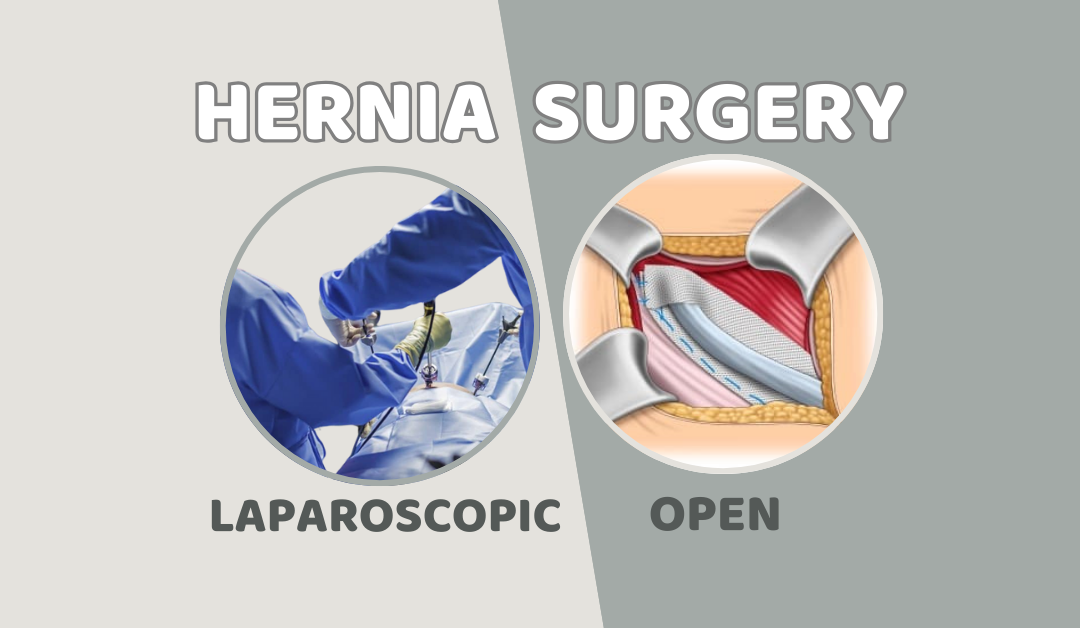A hernia is a hole or protrusion through the muscle layers. It can occur at any place, but the abdomen remains the most common location for this condition. Hernias usually go away on their own. But, in severe cases, the doctor performs surgery to reverse them. The surgery may be open or laparoscopic, depending on the type of hernia and other factors.
Open Hernia Surgery
An open hernia repair is a traditional approach to repairing the hernia. The surgeon makes a large incision around the location of the hernia and operates on it. Once the herniated tissues have been pushed back, they sew the breached muscles back to the body and close the incision with the help of stitches.
Benefits of Open Hernia Surgery
Better View of the Hernia
Open hernia repair gives a better view to the surgeon. Under this type of hernia, doctors do not rely on cameras to get visuals inside the body. As the incision made is large, they can get a direct view and operate on the condition accordingly. The better visualization allows positive outcomes.
Nominal Cost
Compared to laparoscopic hernia repair, the overall cost of open hernia surgery is lower. It is mainly because the doctors do not require any specialized tools or instruments to perform the procedure. It also makes open hernia repair accessible to most patients.
Availability of the Doctor
General surgeons are trained to perform open hernia surgery. As the traditional approach has been the standard for a long time, many doctors are experienced in performing open hernia repair compared to a few surgeons. Thus, you don’t have to run from pillar to post to find an expert to treat the condition.
Disadvantages of Open Hernia Surgery
Longer Recovery
The recovery period after the procedure is too extended. You need to stay at the hospital for as long as the doctor suggests. It may start with a few days and go up to weeks. Once you are discharged from the hospital, it will take another few weeks to recover fully.
Larger Incisions
The incisions made during open hernia repair are large. A large incision not only takes time to heal, but also negatively affects your aesthetics. Additionally, a large incision increases the risk of recurrence in some cases.
Higher Risk of Infection
Opting for an open hernia repair may put you at a higher risk of infection. Having this type of surgery increases post-operative complications, including infection. Even though infections can be cured, there remains a risk of them getting complicated in the worst cases.
Laparoscopic Hernia Surgery
A laparoscopic hernia surgical repair involves making several small incisions at the site of the surgery. The surgeon inserts surgical tools complete with a camera to operate on the hernia from inside. Once they put the herniated tissues back in place, the breached muscles are closed up. After removing surgical instruments, the incisions are sewn. Unlike open surgery, this procedure uses robotic tools and a camera to view the location of the hernia and repair it.
Benefits of Laparoscopic Hernia Surgery
Smaller Incisions
The primary benefit of opting for laparoscopic hernia repair is that the incisions made are small in size. These small incisions cause minimal pain and discomfort and allow for quicker recovery of your wound. You get discharged from the hospital sooner than with open surgery.
Lesser Tissue Trauma
Laparoscopic hernia repair follows a systematic approach to repair the hernia. The procedure is precise, targeting only the affected tissues, resulting in less tissue trauma. As a result, there are fewer chances of surgical complications.
No Scarring
As the incisions are small, no permanent scars are formed on your body. Compared to open surgery, the visibility of scars is lower, which is commendable from an aesthetic viewpoint.
Disadvantages of Laparoscopic Hernia Surgery
Restricted Visualization
The visualization through a camera in a laparoscopic hernia repair is restricted. The field of vision of the camera is limited compared to the human eye, making it harder for the surgeon to properly treat the hernia.
Expensive Procedure
Laparoscopic hernia repair is an expensive procedure because it requires the latest tools and equipment. The surgery uses high-end technology, including robotic surgical tools, which remain unavailable in most hospitals.
Requires Technical Expertise
Unlike open hernia repair, laparoscopic hernia surgery requires the expertise of a skilled professional. This surgery can only be performed by the doctor who has received specialized training.
Open Hernia Surgery vs. Laparoscopic Hernia Surgery – Which One Should I Choose?
There is no single answer to this question. The kind of surgery you should opt for depends on various factors, including the type of hernia, its size, location, your overall health, and lifestyle needs. If your hernia is small in size, the surgeon can repair it with a laparoscopic surgery. On the other hand, if your case is complicated, you may need a traditional approach to fix the problem.
Takeaway
To choose between an open and laparoscopic hernia repair, you should listen to the advice of the doctor and make an informed decision after weighing the pros and cons of each procedure. The doctor will suggest a procedure suitable for your needs.

